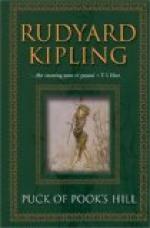’"You’re a fool,” said Allo. “Your Gods and my Gods are threatened by strange Gods, and all you can do is to laugh.”
’"Threatened men live long,” I said.
’"I pray the Gods that may be true,” he said. “But I ask you again not to forget me.”
’We climbed the last hot hill and looked out on the eastern sea, three or four miles off. There was a small sailing-galley of the North Gaul pattern at anchor, her landing-plank down and her sail half up; and below us, alone in a hollow, holding his pony, sat Maximus, Emperor of Britain! He was dressed like a hunter, and he leaned on his little stick; but I knew that back as far as I could see it, and I told Pertinax.
’"You’re madder than Allo!” he said. “It must be the sun!”
’Maximus never stirred till we stood before him. Then he looked me up and down, and said: “Hungry again? It seems to be my destiny to feed you whenever we meet. I have food here. Allo shall cook it.”
’"No,” said Allo. “A Prince in his own land does not wait on wandering Emperors. I feed my two children without asking your leave.” He began to blow up the ashes.
’"I was wrong,” said Pertinax. “We are all mad. Speak up, O Madman called Emperor!”
’Maximus smiled his terrible tight-lipped smile, but two years on the Wall do not make a man afraid of mere looks. So I was not afraid.
’"I meant you, Parnesius, to live and die a Centurion of the Wall,” said Maximus. “But it seems from these,”—he fumbled in his breast—“you can think as well as draw.” He pulled out a roll of letters I had written to my people, full of drawings of Picts, and bears, and men I had met on the Wall. Mother and my sister always liked my pictures.
’He handed me one that I had called “Maximus’s Soldiers”. It showed a row of fat wine-skins, and our old Doctor of the Hunno hospital snuffing at them. Each time that Maximus had taken troops out of Britain to help him to conquer Gaul, he used to send the garrisons more wine—to keep them quiet, I suppose. On the Wall, we always called a wine-skin a “Maximus”. Oh, yes; and I had drawn them in Imperial helmets.
’"Not long since,” he went on, “men’s names were sent up to Caesar for smaller jokes than this.”
’"True, Caesar,” said Pertinax; “but you forget that was before I, your friend’s friend, became such a good spear-thrower.”
’He did not actually point his hunting-spear at Maximus, but balanced it on his palm—so!
’"I was speaking of time past,” said Maximus, never fluttering an eyelid. “Nowadays one is only too pleased to find boys who can think for themselves, and their friends.” He nodded at Pertinax. “Your Father lent me the letters, Parnesius, so you run no risk from me.”
’"None whatever,” said Pertinax, and rubbed the spear-point on his sleeve.
’"I have been forced to reduce the garrisons in Britain, because I need troops in Gaul. Now I come to take troops from the Wall itself,” said he.




